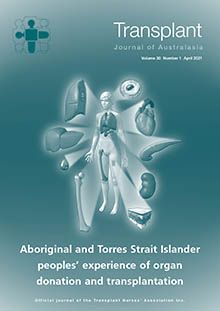Article
Daniela Burke, RN; Rani Martin, RN; Kirstie Wilson, RN; Belinda Bourne, RN MPH;
Bronwyn Levvey, RN; Hilary Stedman, RN; Kovi Levin, MBBS; Steven Ivulich, Jane Harris, BSW;
Jane Miller, DPsych (Clin); Jodi Gillot, CCRN; Nobenguni Ndiweni, CCRN; Emily Yates, CCRN;
Jaideep Vazirani, MBBS BMedSci, Greg Snell, MBBS; Glen Westall, MBBS
Abstract
Full Text
PDF
Author(s)
References
Forewarned by the early COVID-19 experience elsewhere, and the need to create a COVID-safe environment for lung transplantation (LTx) patients and their attendant healthcare workers (HCW), the Lung Transplant Service at The Alfred Hospital in Melbourne radically re-structured its ambulatory out-patient model to an entirely home-based Telehealth service that involved the majority of the LTx staff also working from home.
The hospital’s LTx service manages over 800 post-LTx patients. The hospital’s Telehealth portal was used for patient consults, and daily clinics were established. Administrative, nursing, allied health and physician staff were provided with computers at home, as well as remote access to the hospital’s electronic medical record. The in-patient LTx team were available for critical in-person assessments, specifically for patients early post-LTx. The LTx service remained operational despite two COVID-19 waves in 2020 and 73 LTx and one heart–LTx, a 20% decline from usual baseline. The LTx team have remotely provided over 175 medical and allied health reviews per week. Over 20,000 separate LTx drugs were posted out, providing uninterrupted access to LTx-critical medications. Access to spirometry and bronchoscopy remains suboptimal. Despite widespread community transmission, there was no COVID-19 infection in the LTx team, and only a single episode of self-limiting community-acquired COVID-19 infection in the wider LTx patient population.
Reflecting the need to also provide a COVID-safe environment for HCW, the service established a completely remote ambulatory service that maintained both LTx patients and LTx HCW at home. Whilst COVID-19 infections have been avoided, future studies will need to assess whether remote access to LTx has impacted on non-COVID morbidity and mortality in our LTx population.




